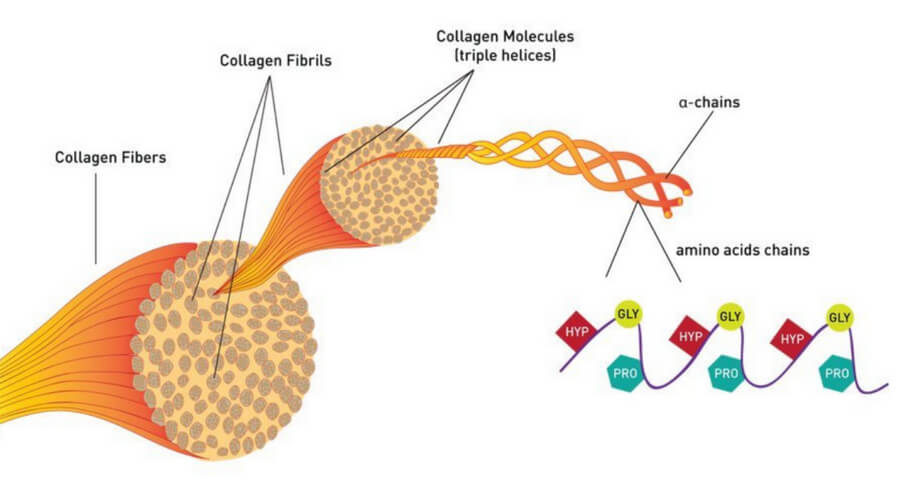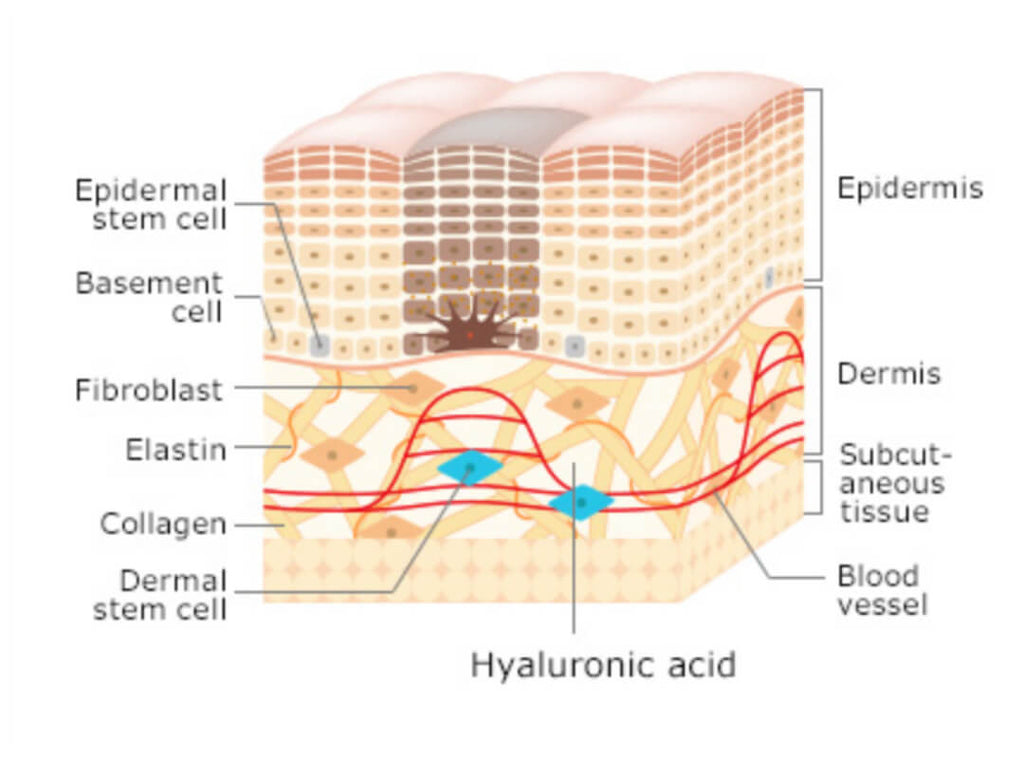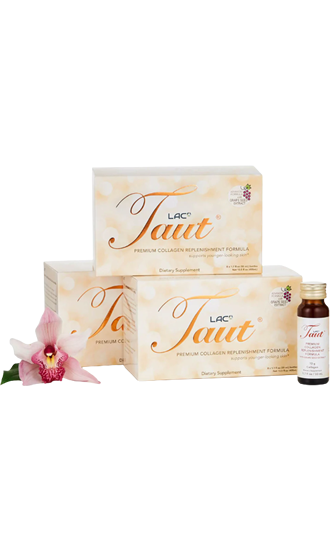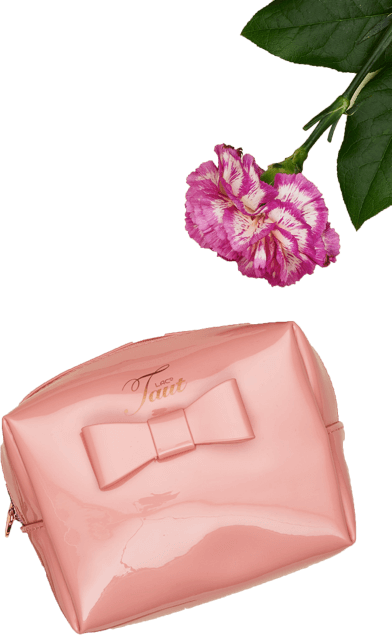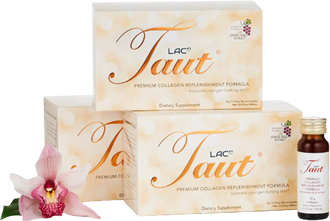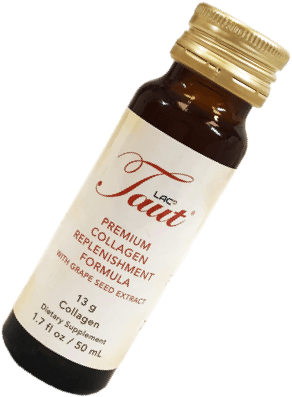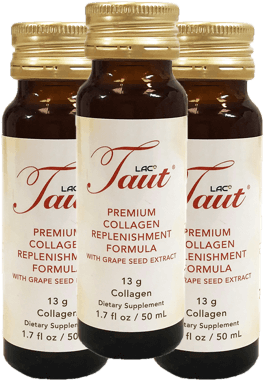Collagen Science In A Nutshell
Multiple clinical trials have confirmed that hydrolyzed collagen, when ingested in a sufficiently high dose, is absorbed into the bloodstream at a high rate, with bio-availability of more than 90%.
Once these peptides enter the bloodstream in a high enough concentration, the body detects their presence and triggers the 'wound healing' response in the brain -- similar to when you cut your finger.
The brain directs the peptides and amino acids to be transported to the dermis layer of the skin, and sends a signal to reactivate the fibroblasts (the specialized 'collagen factory' cells in the dermis, and the primary player on the 'skin repair' team) to synthesize new collagen fibrils, using the high concentration of key peptides present in the dermis as building blocks to initiate collagen production.
Why Are Specific Collagen Peptides Used for Anti-Aging Nutrition & Supplements?
According to many professionals in clinical and aesthetic dermatology, the best collagen supplements for skin can increase and improve the appearance of your skin’s elasticity, firmness, and hydration, while reducing the appearance of fine lines and wrinkles.
Your skin will look younger and healthier, and you’ll be able to recover your skin’s natural glow. Clinical studies show ingesting collagen helps improve skin density, skin hydration, as well as smooth fine lines and wrinkles.
But, Your Collagen Needs to Be Paired With the Right Ingredients...
Yes, collagen can support your skin health but, it's important to combine it with the correct ingredients to truly reap all of its benefits.
Vitamin C is a powerful antioxidant that acts as a co-factor of collagen. Without vitamin C, we cannot absorbs sufficient collagen to enjoy its full skin healing properties. With this in mind, we have coupled our marine collagen with an optimal dose of vitamin C as well as other skin-loving ingredients that will leave you with a glowing complexion.1
Do Oral Collagen Supplements Provide Other Health Benefits?
In addition to the visible benefits of using collagen for human skin, studies show that taking collagen supplements could offer other health benefits. Here are some other collagen uses:
Support Joint & Connective Tissue Health
Studies have shown that collagen supplements may help treat osteoarthritis. Because collagen supplements allow the protein to accumulate in the cartilage, researchers believe this can help decrease the painful symptoms of osteoarthritis and general joint pain while improving overall joint function.
Combined with antioxidants like vitamin C, the best collagen supplements can reduce free radical damage and inflammation in the body, supporting collagen production and the health of our collagen fibers. You may also notice improved bone mineral density and bone markers, as well as stronger muscle tissue.
A Collagen Supplement for Your Gut
Collagen can also help your gut function more effectively, reducing leaky gut and potentially helping your body naturally repair the lining of your gastrointestinal tract so that it works properly. Combine oral supplementation with a balanced diet, rich in citrus fruits, a variety of vegetables, and protein-rich foods, and you'll enjoy healthy collagen levels for years to come.
Stronger Hair & Nails
In cosmetic dermatology, there is also a lot of talk of the benefits of collagen for hair and nail growth. In fact, if you’ve noticed that your nails and hair have started to weaken and break easily, consuming collagen supplements can support your body’s production of this structural protein, reinforcing hair and nail strength.
Can You Get Enough Collagen From Your Diet?
The real question here is, can you eat collagen? The answer is yes but, that's doesn't mean that your body can absorb it. And, that's not to mention the other important factors to keep in mind.
The Myths Surrounding Bone Broth
For many years now, health enthusiasts have touted the benefits of eating protein-rich foods like bone broth to boost collagen production and replenish your skin's collagen stores but, this couldn't be further from the truth.
Bone broth typically only contains small amounts of collagen, meaning it cannot significantly support collagen production. Moreover, it does not contain the correct collagen types to truly support skin health. Bone broth is packed with gelatin which contains more type II collagen. And, while this may support joint health and bone mineral density in small amounts, it will do very little for your skin.
Last but not least, protein-rich foods like bone broth, when consumed in too high a quantity, can contain excess toxic metals like lead, among other nasties.
With this in mind, an oral supplement like Taut's Advanced Liquid Collagen Formula is your best bet when it comes to supporting your skin and reducing collagen loss in the body.
Do Some Foods Contain More collagen Than Others?
All animals contain collagen, with the majority of it concentrated in the joints and skin.
Typically, foods that contain the most collagen include:
- The skin, bones, and connective tissues of animals. For example, pig joints, beef bones, and chicken skin.
- Some types of seafood like jellyfish and fish skin.
As mentioned previously, eating these types of foods does not provide you with adequate amounts of collagen to maintain optimal skin collagen stores. and, keep in mind, that you need other dietary components to support your body's collagen stores. Vitamin C rich foods, for example, such as citrus fruits, peppers, berries, and leafy greens
Sticking to a diet high in plant-based foods will also support your skin by providing you with a wealth of nutrients that can help keep inflammation at bay, thus protecting you from collagen loss.2
Foods That Can Help Boost Collagen
There are some foods that are said to nurture collagen in the body. These include but are not limited to:
- Foods with glycine, proline, and hydroxyproline such as soy, legumes, poultry fish, and eggs.
- Foods high in zinc. For example, nuts, seeds, shellfish, and whole grains.
- Foods high in antioxidants like vitamin C.
What Are the side Effects of Taking Collagen?
Generally speaking, collagen supplements like Taut's have a very good safety profile. That said, not all products are made the same and it is essential that you check the source of the collagen you are taking, and of course, any other ingredients in your supplement. Here are some tips:
Avoid Excessively High Vitamin Doses
When choosing a collagen supplement, you should check that it does not contain excessively high levels of certain vitamins. Many vitamins have an upper intake limit and, when exceeded, can cause serious side effects and health issues long-term.
Be Aware of Herbal Extracts
While vitamins have their upper intake limits, it's also important that you check whether or not the supplements you choose can cause adverse reactions when taken with any prescription medication you may have been prescribed.
Things to Consider During Pregnancy & When Breastfeeding
When it comes to the above, the same goes for women who are pregnant or breastfeeding. While high-quality collagen should not lead to any negative side effects in pregnant and breastfeeding women when taken in the correct doses, it's important to check that other ingredients are safe during these times.
Consult With Your Physician Before Undertaking Heart & Thyroid Tests
Once again, collagen is not the problem when it comes to laboratory tests for the heart and thyroid. It is actually the vitamins that can cause an issue. For example, high doses of biotin can interfere with the results of your tests in both of these instances.
With the above in mind, be sure to check labels before you start taking any supplement to rule out the chances of experiencing any adverse side effects.
At Taut, we only use ingredients from the best possible sources. We also include healthy doses of each ingredient, keeping upper intake limits of vitamins and herbal extracts in mind to ensure that your collagen supplement never gets in the way of your health.

